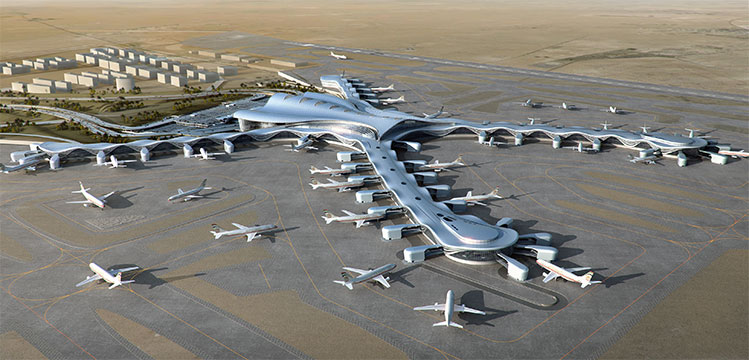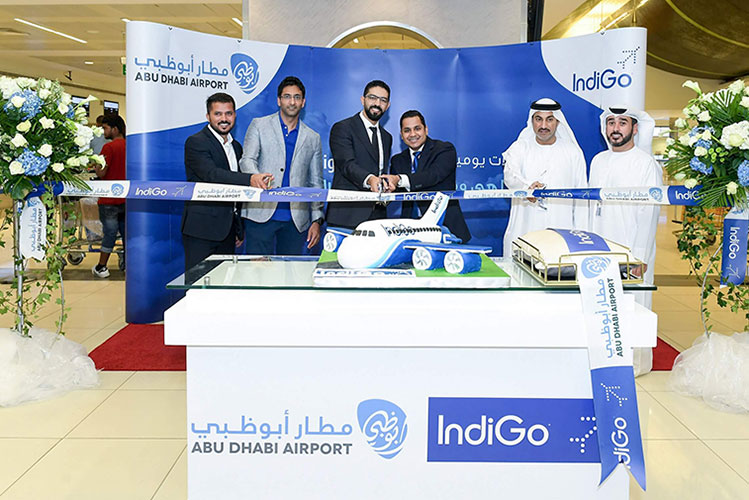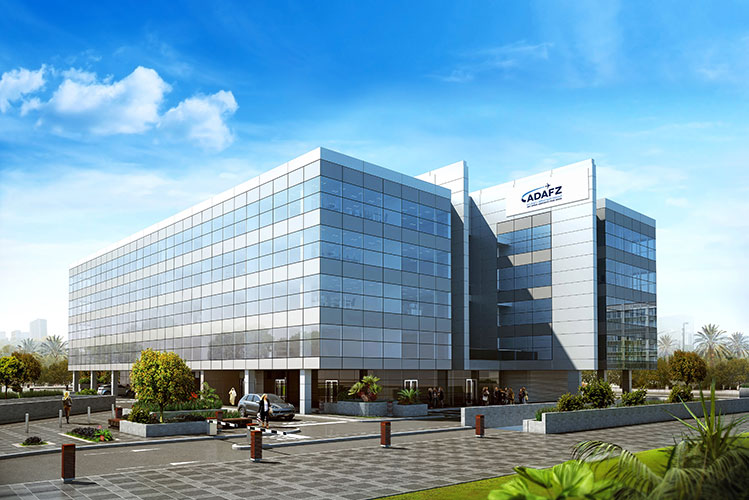
Construction of the Midfield Terminal is more than 96% complete, with operational readiness trials well underway. “Once the Midfield Terminal opens, it will be a stunning ‘destination airport’ in its own right and a unique selling point for airlines considering us for future operations,” says Bryan Thompson, CEO Abu Dhabi Airports.
An interview with Bryan Thompson, CEO Abu Dhabi Airports. By Ross Falconer
Tourism is a key driver in diversifying the UAE economy. The travel and tourism sector accounts for over 11% of the nation’s GDP, according to the World Travel & Tourism Council, contributing AED164.7 billion (€41bn) in 2018.
Abu Dhabi attracted more than 10 million international visitors last year as the emirate beat the favourites to be named ‘Best Destination – Middle East’ at the Travel Weekly Asia Readers’ Choice Awards 2019, having invested heavily in a wealth of cultural, high-end leisure and entertainment attractions. The Louvre Abu Dhabi, Sheikh Zayed Grand Mosque, and Ferrari World are just a few of its major draws. Abu Dhabi Airports is, of course, a key stakeholder in the drive to elevate the emirate’s burgeoning tourism sector still further.
Abu Dhabi International Airport handled 22.3 million passengers in 2018 and is investing to facilitate future growth, with the $3 billion (€2.7bn) Midfield Terminal Building almost complete.
Leading Abu Dhabi Airports’ continued development is Bryan Thompson, who took the helm as CEO in August 2018. His 20-year airport career includes roles at Dubai Airports, Australia Pacific Airports Corporation, Melbourne Airport, GVK (Mumbai International Airport), and Airports Company South Africa.
“I’m extremely fortunate to have enjoyed a very diverse career in the aviation industry, taking in everything from being a pilot, to an air traffic controller, an engineer and even managing rescue services and fire response,” he begins. “So, it’s fair to say that my diverse experience makes a real difference in managing all facets of the complex environment of a modern airport.”
Having worked in most corners of the world helps too – the UAE is a multi-cultural nation of over 200 nationalities. “At Abu Dhabi Airports itself we have 80 nationalities, and this people asset really is a huge strength from which we have forged a truly great team including some exceptional leaders, all of whom I love working with.”
Multi-stakeholder “Abu Dhabi Inc” drives tourism
Thompson says Abu Dhabi Airports, together with the Department of Culture and Tourism, the Department of Transport, Etihad, and other organisations connected with Abu Dhabi’s tourism offering, are all stakeholders in ‘Abu Dhabi Inc’. “Together we work out how to make Abu Dhabi even more attractive, and more accessible, to visitors, such as stopover programmes, and transit visas that allow travellers to leave the airport and enjoy the city and emirate.”
As a hub for Etihad, Abu Dhabi International Airport has seen changes with the airline’s restructuring and review of its priorities, and he says that restructuring is really bearing fruit. “Load factors at Etihad are now among the highest in the region – they are flying full aircraft, which is great for sustainability, and a sure sign of how strong Etihad’s reputation is with flyers,” says Thompson.

Bryan Thompson, CEO Abu Dhabi Airports: “I’m extremely fortunate to have enjoyed a very diverse career in the aviation industry, taking in everything from being a pilot, to an air traffic controller, an engineer and even managing rescue services and fire response. So, it’s fair to say that my diverse experience makes a real difference in managing all facets of the complex environment of a modern airport.”
Bryan Thompson was appointed CEO of Abu Dhabi Airports in August 2018. He is an Australian/South African aviation professional with more than 25 years of international experience in various areas of airport management and operations.
Previous experience:
- 2015-2018: Senior Vice President – Development, Dubai Airports
- 2010-2014: Key executive roles at the Australia Pacific Airports Corporation (APAC), including CEO of Launceston Airport; GM Strategy, Planning and Development, APAC; and GM Assets and Infrastructure Planning, Melbourne Airport
- 2007-2010: Director of Airport Operations and VP Terminal Management, Mumbai International Airport
- Previous: Airports Company South Africa (O.R. Tambo International Airport, Johannesburg), University of South Africa (MBA)
‘Air Arabia Abu Dhabi’ – AUH’s first low-cost carrier
Just last month, in October 2019, Abu Dhabi’s Etihad Aviation Group and Sharjah-based Air Arabia announced the launch of ‘Air Arabia Abu Dhabi’. The UAE capital’s first low-cost carrier will cater to the growing budget travel market, while strengthening connectivity at the airport.
“I think it’s fair to say that Etihad has always been very measured in how routes are selected, so adding a low-cost carrier opens up a huge number of new route possibilities, which will greatly expand choice and further establish Abu Dhabi as a next-generation hub,” says Thompson.
Meanwhile, this year the airport has welcomed new routes to Delhi and Mumbai with IndiGo, Salam (Oman) with Salam Air, and Kathmandu with Himalaya Airlines, as well as a Jazeera Airways service from the emirate’s other significant airport – Al Ain – to Kuwait City.
Midfield Terminal: a ‘destination airport’ in its own right
Abu Dhabi prides itself on offering a truly authentic experience, where traditional culture meets the best of the modern world. For millions of travellers, the new Midfield Terminal Building will be the place where they first enjoy this authentic experience of true Arabian hospitality.
Construction is more than 96% complete, with operational readiness trials well underway. “Once the Midfield Terminal opens, it will be a stunning ‘destination airport’ in its own right and a unique selling point for airlines considering us for future operations,” says Thompson.
Explaining the “seamless travel experience” which permeates both the new building, and the airport in entirety, Thompson says: “We are constantly introducing new facilities and enhancing our infrastructure to provide the highest standard of operational efficiency for our passenger and airline customers.” This includes US Customs and Border Control Pre-clearance facilities for Etihad passengers, and a smart travel system including self-check-in, self-bag drop, e-registration, e-border gates, and self-boarding facilities. Thompson emphasises that experience will be the same for all travellers at the Midfield Terminal, regardless of who they are flying with.
“I can say we are in what I like to call the ‘Last Mile’ in delivering the Midfield Terminal,” says Thompson. “If you look at Abu Dhabi’s accomplishments in recent years – the Louvre, the Sheikh Zayed Grand Mosque, Ferrari World – these are world-class attractions. The new terminal, one of the region’s largest airport infrastructure projects, will be in the same league. Quite simply, we are redefining travel and reinforcing Abu Dhabi’s position as a global hub for business and leisure travel.”
The new terminal is designed to handle over 8,500 people per hour and will increase the airport’s capacity by up to 45 million passengers per year. To deliver this throughput, the facility will include 65 contact and 14 remote stands, 49 gates, 106 boarding bridges, 154 check-in counters, 44 self-check-in counters, and 10 baggage reclaims, with the baggage handling system processing almost 500,000 bags daily.
Harnessing big data and Artificial Intelligence
Technology is vitally important for Abu Dhabi International Airport, with a digital transformation taking place to streamline the business and make it more efficient.
“One thing I am very excited about is how we are harnessing big data and Artificial Intelligence (AI) to relieve anxious passengers on tight connecting flights,” says Thompson. “Through AI, the approaching aircraft will be allocated by air traffic control to ensure the shortest possible physical journey between planes for transiting passengers.”
The airport is also trialling autonomous wheelchairs in partnership with Etihad that will allow passengers with restricted mobility to navigate more easily through the terminals.
“With technology, as with the overall design, we have been careful to consider the human element in every aspect of the airport concept,” Thompson explains. “Just as we don’t want travellers to feel dwarfed by the airport, we don’t want them to feel that technology has pushed out the essential human touches that are needed to feel welcome and reassured.”
Midfield Terminal Building: an intuitive passenger journey
The Midfield Terminal Building is based on an intuitive journey from entrance to gate. “The sightlines are great, and the route is very natural,” says Thompson. “But, in such a massive building, it’s not so much the latest trends that are important – we’ve applied classic design principles to ensure the building is relatable and not overwhelming. When you have 180 metres between pillars, and a roof more than 50 metres above your head, scale becomes a real concern, and we’ve worked incredibly hard to ensure the terminal doesn’t overwhelm or disorientate, but instead feels in-scale and comfortable.”
The building is also designed to be future-proof with the shell of the superstructure expected to have an operational life of 100 years or more, while the interior substructure is modular, and easily moved, adjusted or even replaced when necessary.
“When you look at tech-based facilities – tech today will have an operational lifespan of three to five years, and just a year in some cases. It is essential that a modern building can easily manage this level of replacement activity and upgrade, and the Midfield Terminal Building has that flexibility inbuilt from the start.”
Thompson says that the importance of commercial and retail revenues differs from other airports: “We are more dependent on non-aeronautical revenue than aeronautical. We have deliberately chosen that model specifically to ensure we are as attractive a destination as possible for airlines – and, by extension, a first-class airport for passengers – of all classes – throughout the UAE.”
The Midfield Terminal will feature an array of retail and food and beverage offerings, spread across 23,000 square metres. “That puts it in the same league as some of the malls we see in the region – and we believe is a key factor in persuading residents in all emirates to see Abu Dhabi as a viable first choice of airport; not just those living in the capital.”

In June 2019, IndiGo, India’s largest airline, launched two daily services from Delhi and Mumbai to Abu Dhabi. “This enhanced connectivity reflects the strong connection between the UAE and India in a variety of areas including commerce and tourism,” says Bryan Thompson, CEO Abu Dhabi Airports.
Sustainability based on Sheikh Zayed’s teachings
Sustainability is a cornerstone of Abu Dhabi Airports’ corporate values, drawn from the teachings of the late Sheikh Zayed, the founding father of the United Arab Emirates, and an area of operations in which the company continuously strives to improve.
“We are passionate about ensuring our business is sustainable and reducing our impact on the environment through the implementation of a range of internal programmes and initiatives,” says Thompson.
Indeed, Abu Dhabi International Airport is accredited at Level 3 Optimisation of ACI’s Airport Carbon Accreditation. “In addition to that achievement, in 2017, Abu Dhabi Airports was the first airports group in the region to sign up to the global sustainability initiative ‘The Airports Sustainability Declaration’.”
In 2018, Abu Dhabi Airports increased its recycling rate by 8%, reduced its energy consumption by 19%, and its water consumption by 71%, compared with 2017 levels.

Abu Dhabi Airports Free Zone is now one of the fastest-growing in the region and is absolutely at the heart of Abu Dhabi Airports’ plans to grow and further position itself as an essential, high-tech logistics hub.
Abu Dhabi Airports Free Zone high-tech logistics hub
Abu Dhabi Airports Free Zone is now one of the fastest-growing in the region and is absolutely at the heart of Abu Dhabi Airports’ plans to grow and further position itself as an essential, high-tech logistics hub.
“Essentially, the whole airport and its environs are one big free zone, with different business parks offering different solutions to local and global businesses,” explains Thompson. “The next phase of the flagship Al Falah District will further our goal of providing a one-stop shop for everything from manufacturing to logistics to cold chain solutions, and in sectors from aerospace to pharmaceuticals.”
“A true global tourism destination”
Abu Dhabi Airports is hosting this year’s ACI Airport Exchange, 25-27 November, where delegates will enjoy an “authentic experience of true Arabian hospitality first-hand”.
“The event is going to be the pre-eminent airport sector gathering in 2019, so I expect some fascinating sessions and workshops on the latest trends in airport operations and security, as well as plenty of networking,” Thompson enthuses. “I’m also very excited to be showing colleagues from around the world just how much Abu Dhabi has to offer, in terms of being a true global tourism destination. I’ve touched on the Louvre before, but there’s so much to do in exploring the culture and heritage of the emirate, and beautiful desert wilderness around the lush Liwa Oasis. And, of course, I’m hoping delegates can stay on a few more days and soak up the atmosphere at the Abu Dhabi F1 Grand Prix – a real highpoint in the global motorsports calendar.”
Looking ahead, the priority is quite simply to begin operations in the new Midfield Terminal Building. “When that’s done, we can leverage everything Abu Dhabi has to offer to demonstrate to the world that this is the must-visit Middle East destination, and the new hub of choice for travellers looking at breaking up their long-haul flights.”







